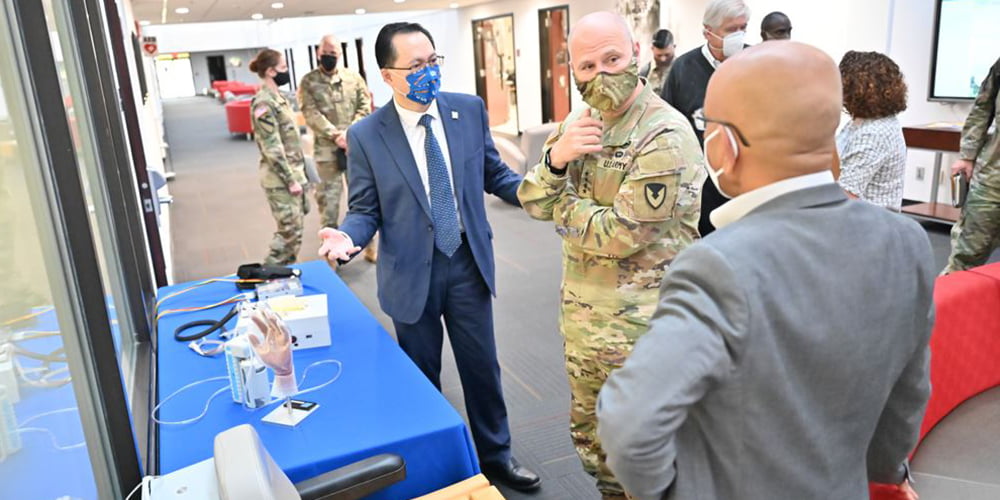U.S. Army Materiel Command previews Maverick innovations

Gen. Edward M. Daly, commanding general of the U.S. Army Materiel Command, visited The University of Texas at Arlington Research Institute (UTARI) on Thursday to learn about the University’s innovations in biomedical technologies, automation and intelligent systems and predictive performance methodologies.
Daly joined UTA Interim President Teik C. Lim and UTARI Interim Executive Director and Director of Research Eileen Clements to learn first-hand about UTA’s endeavors to develop cutting-edge technologies for rehabilitation and wound healing, autonomous vehicles and advanced composites and materials.
“General Daly’s visit represents the potential for UTA researchers to expand the application of their novel technologies and deliver solutions that reinforce our nation’s defense capabilities,” Lim said. “I appreciate the opportunity to explore potential partnerships between the University and Army Materiel Command.”
The day began with a demonstration of biomedical devices developed by the Division for Biomedical Technologies led by Muthu Wijesundara, principal research scientist.
Wijesundara’s division focuses on the development of clinically relevant devices and systems that can be utilized by health care providers and patients to enhance diagnostics, treatment, rehabilitation and preventative care. His lab’s REHEAL glove is an advanced hand-wound care system that enables delivery of localized treatments including therapeutic drug delivery and negative pressure wound therapy.
While at UTARI, Daly attended a research presentation by Nick Gans, head of the Division of Automation and Intelligent Systems.
Gans' research team focuses on automation for development and prototyping of novel and advanced products, such as autonomous vehicles and service robotics. Recent research and development have focused on the distributed control of multiple autonomous vehicles, including air and ground, coordinating on common missions.
Daly was also briefed by Vamsee Vadlamudi, research scientist for the Institute for Predictive Performance Methodologies (IPPM), about the institute’s ongoing research into performance prediction for advanced composites and materials. IPPM’s research staff specializes in cutting-edge modeling and experimental analysis that will enable non-destructive testing for predicting the failure of or damage propagation within composite structures for Department of Defense, commercial and industrial applications.
The general’s visit concluded with a demonstration of IPPM’s material testing system, a device that analyzes the structural endurance of materials in varied environments.
“With our leading-edge capabilities in automation, prototyping and material performance, UTARI is quickly gaining a reputation for its ability to help industries apply advanced research to their technology needs,” Clements said. “Our in-house team of full-time researchers possess multidisciplinary skills that make the institute’s innovations relevant not only to the commercial marketplace, but to government projects as well.”